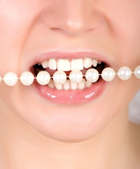 The structure of a tooth has three distinct layers. On the outside is the hard enamel that protects the more sensitive inside layers of the tooth. Directly inside the enamel is the dentine which is a slightly softer material that surrounds the dental nerve in the centre. If the outer protective enamel layer is damaged either through decay or as the result of an accident it can become necessary to provide the tooth with an extra layer of protection. This usually comes in the form of a tooth shaped and coloured dental crown that is fixed over the top of the damaged tooth.
The structure of a tooth has three distinct layers. On the outside is the hard enamel that protects the more sensitive inside layers of the tooth. Directly inside the enamel is the dentine which is a slightly softer material that surrounds the dental nerve in the centre. If the outer protective enamel layer is damaged either through decay or as the result of an accident it can become necessary to provide the tooth with an extra layer of protection. This usually comes in the form of a tooth shaped and coloured dental crown that is fixed over the top of the damaged tooth.
Dental crowns cover all parts of the tooth exposed above the crown to seal off the sensitive inner parts of the tooth to stimuli such as hot or cold food which can be very painful. Crowns are usually made from porcelain or a mix of porcelain and metal (although increasingly they are made solely from porcelain as technology improves). This makes them very resistant to breaking and staining and also provides a very lifelike appearance.
In the past, some dentists were reluctant to fit dental crows unless absolutely necessary because they involved the removal of otherwise healthy enamel but recent computer technology has allowed the manufacture of thinner, stronger porcelain crowns that require minimal enamel removal.
Leeds dentists can fit dental crowns manufactured using the latest technology to protect damaged teeth and restore the cosmetic appearance of stained or worn teeth using a thinner crown called a veneer. If you have a damaged tooth that is causing you pain then make an appointment to ask about dental crowns.





 In the past, patients and dentists have been slightly reluctant to use dental crowns unless absolutely necessary. This is because the old laboratory made crowns could often be bulky and require significant enamel removal to allow them to fit naturally over the top of the tooth. Removing otherwise healthy enamel is never ideal so dentists would often opt to use other treatments such as fillings and dental bonding.
In the past, patients and dentists have been slightly reluctant to use dental crowns unless absolutely necessary. This is because the old laboratory made crowns could often be bulky and require significant enamel removal to allow them to fit naturally over the top of the tooth. Removing otherwise healthy enamel is never ideal so dentists would often opt to use other treatments such as fillings and dental bonding. Porcelain crowns are ceramic caps that are fixed over damaged teeth to protect them from further damage and preserve their functionality. They are commonly used to repair damage caused by chipped, cracked or broken teeth and can also be used to add extra security to dental processes such as root canal procedures and fillings.
Porcelain crowns are ceramic caps that are fixed over damaged teeth to protect them from further damage and preserve their functionality. They are commonly used to repair damage caused by chipped, cracked or broken teeth and can also be used to add extra security to dental processes such as root canal procedures and fillings. When a tooth is chipped, cracked or broken, either by sporting injury or some other kind of head trauma, it can be very painful. But the pain may last longer than just the original injury and may require extensive dental treatment to prevent further damage to the tooth. The dentist will first try to fix the tooth using composite dental bonding. If the damage is too severe to fix with resin the tooth may need a crown to protect it and restore its structural integrity.
When a tooth is chipped, cracked or broken, either by sporting injury or some other kind of head trauma, it can be very painful. But the pain may last longer than just the original injury and may require extensive dental treatment to prevent further damage to the tooth. The dentist will first try to fix the tooth using composite dental bonding. If the damage is too severe to fix with resin the tooth may need a crown to protect it and restore its structural integrity. Some of the most common dental injuries occur when patients crack or break a tooth. This often happens while undertaking physical activity or can be the result of a head trauma, such as a car crash. Apart from being painful, these types of dental injury can also need complex cosmetic dental procedures to fix them. With cracks and breaks, dental bonding and fillings are sometimes insufficient, especially if the injury is quite severe, and in these instances a dental crown is the only option to save the tooth.
Some of the most common dental injuries occur when patients crack or break a tooth. This often happens while undertaking physical activity or can be the result of a head trauma, such as a car crash. Apart from being painful, these types of dental injury can also need complex cosmetic dental procedures to fix them. With cracks and breaks, dental bonding and fillings are sometimes insufficient, especially if the injury is quite severe, and in these instances a dental crown is the only option to save the tooth. For patients who have suffered a cracked, broken or damaged tooth, a
For patients who have suffered a cracked, broken or damaged tooth, a 

